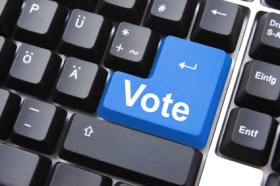
But even though 64 percent favor online voting, they are about split evenly over whether they are confident or not that such a system couldn’t be hacked, or somehow there would not be cheating in the vote tallies, finds UPD pollster Dan Jones & Associates.
Twenty of Utah’s 29 counties had vote-by-mail in this year’s primaries, and will do so again in November.
The by-mail ballots seem to be a hit, as various county clerks using the new method believe the ease and comfort of voting at home increased primary voter turnout.
Online voting seems to be the next step in America’s and Utah’s citizen civic participation – since we already bank online, pay bills and taxes online, even review our medical records online.
But old traditions are hard to break.
Utahns and state officials wouldn’t move to electronic voting machines – ballots still cast at polling places – as the federal government required in the 2000s until a system could be found to print a back-up, verifiable, ballot from the voting machine.
Those machines are now getting old, and it would cost counties (whose clerks formally run elections) millions of dollars to replace them.
Vote-by-mail is a much cheaper alternative.
And the paper mail-in ballots are still clearly verifiable – with one Utah House GOP primary decided by eight votes and both candidates seem to accept of the final recount numbers.
In any case, Utahns clearly favor moving to some kind of verifiable online voting procedure, where a person would sign up to vote online, get a PIN and be able to cast a ballot from their computer, tablet or smartphone, finds Jones.
Some numbers:
- 64 percent “strongly” or “somewhat” favor an online voting option.
- 31 percent oppose it.
- And 5 percent don’t know.
As you might expect, Republicans and those who said they are “very conservative” in their political views are laggards – not as ready to accept such a new system.
- Still, 60 percent of those who self-identified themselves as Republicans support online voting.
- 35 percent of Republicans don’t want it.
- And 5 percent of Republicans don’t know.
Democrats and political independents (who don’t belong to any party) are full steam ahead.
- Democrats favor online voting, 71-24 percent.
- Political independents favor it, 71-25 percent.
And wouldn’t you know, younger Utahns, who use technology easily really want online voting.
- 18-24-year-olds favor it, 89-9 percent.
And the old folks worry about it.
- Those 65 years old or older are split, 48 percent in favor of online voting, 40 percent opposed.
And, yes, the “very conservatives” are actually against it, 48 percent opposed to only 46 percent in favor.
But Jones finds there is still misgiving about online voting, many Utahns not confident that such a process could be kept safe from hacking or cheating.
This week’s concerns over the hacking, apparently, by Russian government agencies of the U.S. Democratic National Committee’s emails is just one example – although an online, PIN-verified voting system with a paper trail backup would seem to be more protectable.
Jones finds:
- 49 percent of Utahns would be confident that a new online voting system would be safe and accurate.
- 47 percent said they would not be confident such a system couldn’t be hacked or cheating take place.
- And 3 percent don’t know.
Again, Republicans are leerier than Democrats and independents.
- 51 percent of Republicans are not confident in such a system.
- 47 percent would be.
- And 3 percent don’t know.
- Democrats are confident, 56-41 percent, that such a system wouldn’t be hacked, no cheating.
- Political independents believe state and county officials could set up such a safe online voting process, 52-41 percent.
Yes, 18-24 year olds are confident, 59-39 percent.
And, yes, the old folks, 65 years old and older, are not. Only 41 percent of old folks are sure such an online system could be safe, 57 percent are not.
And the “very conservatives?”
- 63 percent said they would not be confident such a system could be set up without the fear of hacking or cheating.
- Only 35 percent are confident.
Jones polled 614 adults from June 8-17. The poll has a margin of error of plus or minus 395 percent.

